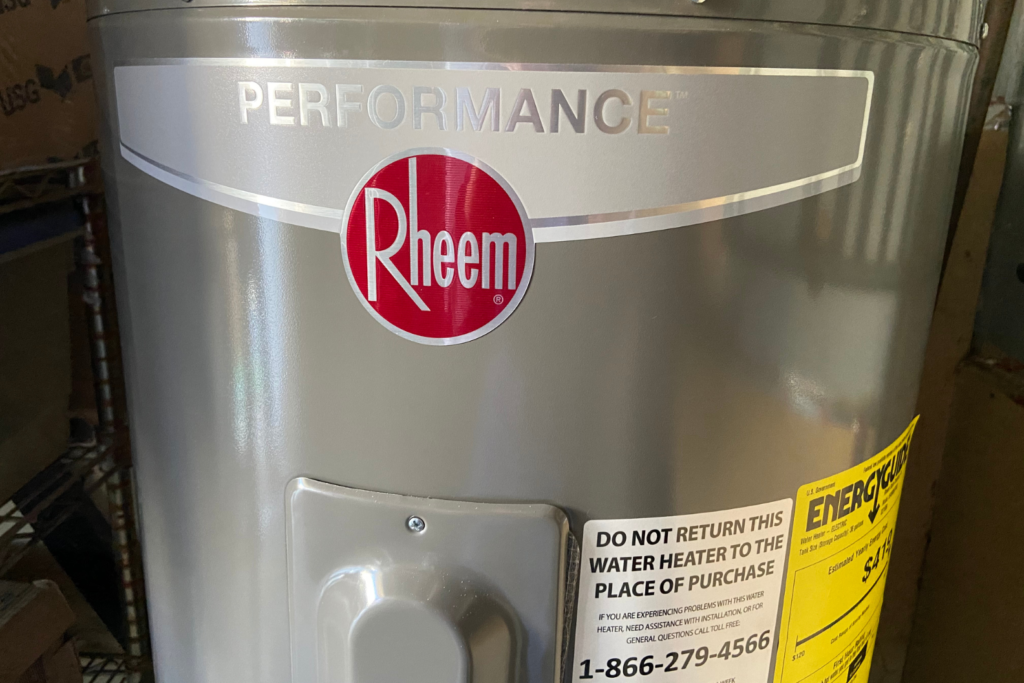When it comes to purchasing a water heater nowadays, there are certainly a few decisions to be made. First and foremost, you’ll need to pick between going with either a traditional storage tank water heater or a tankless water heater. Both offer their own unique advantages and there are definitely specific situations where one might make more sense than the other. After choosing between those two options, you’ll then have to pick a brand, size and so on! Luckily, if you’re working with an experienced plumber, they’ll easily be able to guide you in the right direction and provide some expert advice to ensure you receive the best return on your investment.
As a homeowner, two primary things you’re likely hoping to achieve with your water heater are:
- Having a heater that lasts its full projected lifespan and doesn’t end up needing replaced earlier than expected.
- Having a heater that operates in an efficient manner and doesn’t waste any unnecessary energy in doing its normal responsibilities.
Obviously you’re also going to want a water heater that consistently delivers hot water, but it’s safe to say those two qualities listed above are a must too, right? Over the course of this week’s blog post, we’ll provide you with a few tips and tricks for keeping your water heater running effectively AND efficiently.
What temperature is your water heater set at?
One of the first questions you should evaluate is the temperature in which you have the water heater’s thermostat set at. Unsurprisingly, when you lower the thermostat at which the water is heated to, this can also lower your energy costs. As a general rule of thumb, the recommended range for a water heater’s temperature is between 120-140 degrees Fahrenheit. You may have heard this before, but anything below 120-degrees creates the potential for bacteria to develop. Meanwhile, when you go with anything over 140-degrees, you run the risk of scalding. To sum it up, if you want to save a few bucks on your utility bills, you may try turning down the water heater’s thermostat a few degrees. Just remember to keep it between that range I mentioned above.
When was the last time you flushed your water heater?
When discussing ways to maintain an efficient water heater, does it come as any surprise that routine “maintenance” will be involved?! Fortunately, your water heater isn’t going to be something that you’ll have to regularly think about throughout the year. For the most part, it will continue to run without any work from you. However, one easy maintenance task that you’ll want to complete is an annual flush. Considering the Kansas City area has hard water, homeowners can experience mineral sediment build-up at the bottom of their tank. Over time (if it’s not flushed out), this build-up will make your water heater work harder to perform its regular duties. This will gradually wear on the heater’s tank and can lead to quicker deterioration. All in all, if you’re looking for one maintenance task that’s worth adding to your to-do list, make it a water heater flush.
Have you considered switching to a tankless water heater?
Tankless water heaters have been the topic of discussion on numerous previous blog posts. Even though storage tank water heaters are still the more common of the two, there’s no denying that tankless water heaters are gradually growing in popularity. Along with occupying less space, they also tend to have longer lifespans and operate in a more efficient manner. Granted they do come at a higher initial price tag, there’s certainly a lot to like. Now…back to the efficiency discussion. While there are several factors that come into play, tankless water heaters are generally more efficient than storage tank heaters. In short, tankless heaters are also referred to as “on-demand” water heaters. In other words, they’re only heating the water when it’s actually needed. In doing so, you don’t have to worry about losing any heat, as can be seen when hot water sits in a storage tank without being used. From a financial perspective, homeowners will just want to consider whether this efficiency boost (and longer lifespan) outweighs the higher up-front installation cost. You’ll want to consider factors like: How long are you planning on living in the current house you’re at? Do you have a good location to have a tankless installed with the proper venting set-up?
If you’re struggling to decide whether or not a tankless water heater is a good fit for your home, don’t hesitate to give us a call at (816) 348-3481. Our team has plenty of experience with them and can help answer any questions.
What’s the current status of your fixtures?
When on the topic of plumbing and efficiency, it’s important to understand that there are numerous components involved. Yes, having an efficient water heater is a major factor in its own regard, but there are also plenty of other components intertwined that are worth monitoring as well. After all, if your water heater operates extremely efficiently, but your faucets and showerheads are the complete opposite, you’ll end up with a water bill that’s higher than it should be. That being said, if you’re looking to achieve efficiency in general, take a minute to evaluate some of your various plumbing fixtures throughout the house. Whether it be toilets, faucets or showerheads, are any of them fairly old or prone to leaks? Over the years, plumbing fixture brands have gotten better at improving efficiency and minimizing the amount of water they use. Hence, why you may hear terms like “low-flow” fixtures or see fixtures that have labels designating their efficiency criteria. These are all designed to improve efficiency!
More tips and tricks
While a water heater’s primary purpose is rather straightforward, there is certainly no shortage of topics to discuss around them. That’s a major reason why they’re such a popular topic on our blog! In any case, before we close out this week’s blog, I just wanted to quickly mention a few added water heater efficiency topics. The size of the heater that you purchase is extremely important. Failing to purchase a big enough tank for your household can lead to consistently running out of hot water. As is the case with many other plumbing fixtures, you’ll want to take into account the brand. For storage tank heaters, we’ve had great results with AO Smith, Rheem and Bradford While. On the flip side, in regards to tankless heaters, we recommend Navien. Lastly, even though the water heater isn’t something you regularly take a look at, it doesn’t hurt to get eyes on it every now and then to ensure there are no leaks or anything out of the ordinary. As you can likely guess, the longer you let an issue sit, the worse it generally ends up getting!
Expert Water Heater Services in Kansas City
At Stine-Nichols Plumbing, water heaters are definitely something that’s in our regular vocabulary. They’re undoubtedly an important plumbing piece and one that homeowners need working on a daily basis. As shown throughout this blog, there are more than a few ways in which you can improve the efficiency of your home’s water heating efforts.
As we wrap up this blog, we just wanted to give a quick overview of our business for anyone that may be stopping by the blog for the first time. Stine-Nichols Plumbing is located in North Kansas City, MO and provides residential, commercial and new construction plumbing services throughout the Kansas City area. As you can likely guess based off this week’s blog post, that includes water heater services. From installing new heaters, repairing existing ones or even routine maintenance, we have you covered for all of your water heater needs. To speak with a member of our team or request a free quote, don’t hesitate to click the link HERE.


